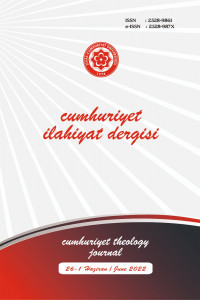Köprülüzâde Abdullah Paşa ve El Yazması Divanının Muhtevası
Köprülü-zāde ‘Abd Allāh Pas̲h̲a and the Contents of his Poetry Book (Dīwān) in Manuscript Form
Author(s): Orhan İyişenyürekSubject(s): Education, Islam studies, Other Language Literature, The Ottoman Empire, Philology
Published by: Cumhuriyet Üniversitesi İlahyat Fakültesi
Keywords: Arabic Language and Literature; Arabic Poetry; Ottoman Period; Köprülü ‘Abd Allāh Pas̲h̲a; Dīwān;
Summary/Abstract: Studies on Arabic language and literature of the Ottoman Period generally focused on the Arabic language grammar and rhetoric education given by the Ottomans in madrasas. Ottoman scholars did, however, produce some works in the field of Arabic poetry. Efforts to unearth the studies carried out in the field of Arabic poetry and literature in the mentioned period have been increasing in recent years. In this study, Köprülü ‘Abd Allāh Pas̲h̲a (d. 1148/1735), an Ottoman Pas̲h̲a, and the content of his poetry dīwān were examined. ‘Abd Allāh Pas̲h̲a is a poet and a Qurʾān recitation scholar who wrote an Arabic dīwān and belonged to the Köprülü family, which left its mark on the Ottoman administration for a period of time, serving both science and the state. ‘Abd Allāh Pas̲h̲a is the grandson of Köprülü Meḥmed Pas̲h̲a (d. 1072/1661), the son of Köprülü-zāde Fāzil Muṣṭafā Pas̲h̲a (d. 1102/1691), and the brother of Köprülü-zāde Nu’mān Pas̲h̲a (d. 1131/1719). ‘Abd Allāh Pas̲h̲a's grandfather, father and elder brother served as grand viziers. ‘Abd Allāh Pas̲h̲a, who naturally received a good education in his childhood due to his family, held important state duties such as Istanbul District Governorship, dome vizier, marksmanship, governorship, pilgrimage emirate and chief commander. Adopting a fair administration style during his duties, the Pas̲h̲a was appreciated by those under his rule and praised with poems by some poets. He benefited greatly from al-Azhar scholars during his governorship of Egypt and encouraged them to produce various works. He served as the chief commander in the Ottoman-Iranian wars during the first quarter of the 18th century and was martyred in one of these wars. Abd Allāh Pasha, like other Köprülü family members, set up a number of Islamic foundations (waqf). In addition to his literary works, he also produced scholarship related to the science of Qurʾānic recitation. His dīwān (Nuḫbat al-Ash'âr, alDurriyyât) is in manuscript form in various libraries. There has not been any research done on his dīwān which is still in manuscript form. ‘Abd Allāh Pas̲h̲a wrote poems about some of the subjects dealt with in classical Arabic literature. As in traditional Arabic poetry, the poet treated emotions like love, longing, separation pain, and the physical characteristics of the beloved woman, reunion, begging, fidelity, sadness, tears, and reproach in the ghazals. Bringing a chaste and level of love to the agenda, the poet idealized the love of women by using some symbolic elements. The fact that some words used in old Arabic poetry are seen in his poems with ghazal content shows that the poet adheres to the traditional poetry content. In the couplets in which the theme of fakḫr is handled, the poet boasted about his family elders such as his father, grandfather and uncle, and was proud of the valor and courage he displayed on the battlefields. He uses themes such as confessing his helplessness in front of Allah, asking for forgiveness, asking for protection from the bad desires of the soul in his munād̲jāt poems, begged Allah to reunite with his beloved. He often ̲ provides various descriptions in his poems, of horses, swords, battlefields, nature, women, etc. Couplets containing advice such as avoiding sins, avoiding shameful actions, and advising acquisition of virtuous behaviors can be found in some of the poems. Lament poetry is another genre discussed in the dīwān. The poet, who lost his beloved Zübeyde K̲h̲āni ̊m, the daughter of S̲h̲eyk̲h̲al-Islām Fayḍ Allāh Efendi (d. 1115/1703), sang elegies about her. As in the traditional poetry form, the deep sadness felt after the deceased dominates the elegy poems in general. Remembering the beautiful features of the lost person and trying to endure the pain of her absence were the prominent emotions in his elegies. In his satirical poems, the poet criticizes the bad behavior of unqualified administrators, whom he frequently encounters as a result of his position as a public official. In his poems, bad behaviors such as oppressing the public, flattering, being lazy, indulging in wealth, drinking alcohol, and not caring about kinship relations were criticized. The theme of praise, which is one of the main subjects of Arabic poetry, also took place in the poems. In one of his poems, he praised Istanbul and expressed his longing for it. The wars that ‘Abd Allāh Pas̲h̲a experienced near the end of his life, as well as the Ad̲h̲arbayd̲jān expedition, were topics that he addressed in his poetry. Subjects such as describing the battlefield, heroism, humiliation of the enemies, the experiences of the war, rejoicing in the victory, and being proud are discussed in his poem about the capture of Tabrīz. Despite the fact that Arabic is not his mother tongue, ‘Abd Allāh Pas̲h̲a, who is very good at reciting poetry in Arabic, has many poetry subjects in his diwan. This research is also expected to aid in the debunking of claims that Arabic died out during the Ottoman period.
Journal: Cumhuriyet İlahiyat Dergisi
- Issue Year: 26/2022
- Issue No: 1
- Page Range: 23-44
- Page Count: 22
- Language: Turkish

